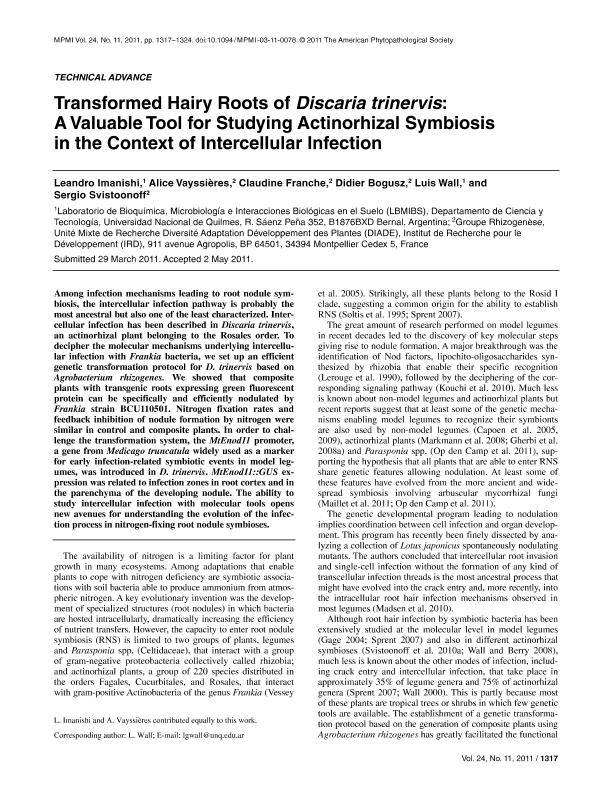Mostrar el registro sencillo del ítem
dc.contributor.author
Imanishi, Leandro Ezequiel

dc.contributor.author
Vayssières, Alice
dc.contributor.author
Franche, Claudine
dc.contributor.author
Bogusz, Didier
dc.contributor.author
Wall, Luis Gabriel

dc.contributor.author
Svistoonoff, Sergio
dc.date.available
2023-04-14T12:08:04Z
dc.date.issued
2011-11
dc.identifier.citation
Imanishi, Leandro Ezequiel; Vayssières, Alice; Franche, Claudine; Bogusz, Didier; Wall, Luis Gabriel; et al.; Transformed Hairy Roots of Discaria trinervis: A Valuable Tool for Studying Actinorhizal Symbiosis in the Context of Intercellular Infection; American Phytopathological Society; Molecular Plant-Microbe Interactions; 24; 11; 11-2011; 1317-1324
dc.identifier.issn
0894-0282
dc.identifier.uri
http://hdl.handle.net/11336/193806
dc.description.abstract
Among infection mechanisms leading to root nodule symbiosis, the intercellular infection pathway is probably the most ancestral but also one of the least characterized. Intercellular infection has been described in Discaria trinervis, an actinorhizal plant belonging to the Rosales order. To decipher the molecular mechanisms underlying intercellular infection with Frankia bacteria, we set up an efficient genetic transformation protocol for D. trinervis based on Agrobacterium rhizogenes. We showed that composite plants with transgenic roots expressing green fluorescent protein can be specifically and efficiently nodulated by Frankia strain BCU110501. Nitrogen fixation rates and feedback inhibition of nodule formation by nitrogen were similar in control and composite plants. In order to challenge the transformation system, the MtEnod11 promoter, a gene from Medicago truncatula widely used as a marker for early infection-related symbiotic events in model legumes, was introduced in D. trinervis. MtEnod11::GUS expression was related to infection zones in root cortex and in the parenchyma of the developing nodule. The ability to study intercellular infection with molecular tools opens new avenues for understanding the evolution of the infection process in nitrogen-fixing root nodule symbioses.
dc.format
application/pdf
dc.language.iso
eng
dc.publisher
American Phytopathological Society

dc.rights
info:eu-repo/semantics/openAccess
dc.rights.uri
https://creativecommons.org/licenses/by-nc-sa/2.5/ar/
dc.subject
ACTINORHIZAL SYMBIOSES
dc.subject
DISCARIA TRINERVIS
dc.subject
AGROBACTERIUM RHIZOGENES
dc.subject
NITROGEN FIXATION
dc.subject.classification
Otros Tópicos Biológicos

dc.subject.classification
Ciencias Biológicas

dc.subject.classification
CIENCIAS NATURALES Y EXACTAS

dc.title
Transformed Hairy Roots of Discaria trinervis: A Valuable Tool for Studying Actinorhizal Symbiosis in the Context of Intercellular Infection
dc.type
info:eu-repo/semantics/article
dc.type
info:ar-repo/semantics/artículo
dc.type
info:eu-repo/semantics/publishedVersion
dc.date.updated
2023-04-13T14:54:05Z
dc.journal.volume
24
dc.journal.number
11
dc.journal.pagination
1317-1324
dc.journal.pais
Estados Unidos

dc.description.fil
Fil: Imanishi, Leandro Ezequiel. Universidad Nacional de Quilmes. Departamento de Ciencia y Tecnología; Argentina. Consejo Nacional de Investigaciones Científicas y Técnicas; Argentina
dc.description.fil
Fil: Vayssières, Alice. Institut de Recherche Pour Le Developpement; Francia
dc.description.fil
Fil: Franche, Claudine. Institut de Recherche Pour Le Developpement; Francia
dc.description.fil
Fil: Bogusz, Didier. Institut de Recherche Pour Le Developpement; Francia
dc.description.fil
Fil: Wall, Luis Gabriel. Universidad Nacional de Quilmes. Departamento de Ciencia y Tecnología; Argentina. Consejo Nacional de Investigaciones Científicas y Técnicas; Argentina
dc.description.fil
Fil: Svistoonoff, Sergio. Institut de Recherche Pour Le Developpement; Francia
dc.journal.title
Molecular Plant-Microbe Interactions

dc.relation.alternativeid
info:eu-repo/semantics/altIdentifier/doi/http://dx.doi.org/10.1094/MPMI-03-11-0078
Archivos asociados
